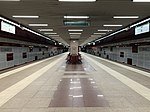1 Mai metro station
2000 establishments in RomaniaBucharest Metro stationsEuropean rapid transit stubsRailway stations opened in 2000Romania transport stubs ... and 1 more
Romanian railway station stubs

1 Mai is a metro station in northern Bucharest, serving line M4. It is situated in Chibrit or Clăbucet Square, at the intersection of Calea Griviței, Ion Mihalache Boulevard, and Bucureștii Noi Road. The station was opened on 1 March 2000, as part of Stage I of the M4 line, from Gara de Nord to 1 Mai. On 1 July 2011, the line was extended to Parc Bazilescu.
Excerpt from the Wikipedia article 1 Mai metro station (License: CC BY-SA 3.0, Authors, Images).1 Mai metro station
Bulevardul Ion Mihalache, Bucharest 1 Mai (Sector 1)
Geographical coordinates (GPS) Address Nearby Places Show on map
Geographical coordinates (GPS)
| Latitude | Longitude |
|---|---|
| N 44.471208333333 ° | E 26.050555555556 ° |
Address
1 Mai
Bulevardul Ion Mihalache
010721 Bucharest, 1 Mai (Sector 1)
Romania
Open on Google Maps






